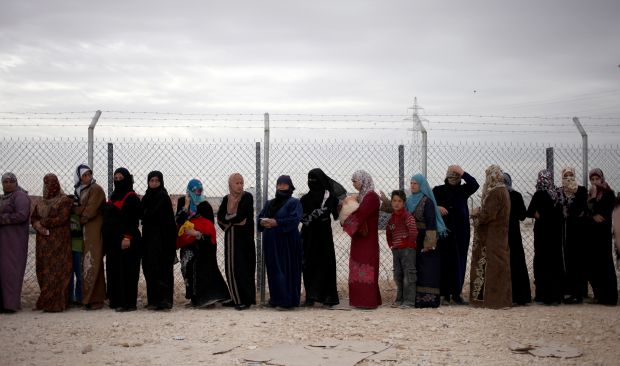
Syrian refugee women stand in line to receive their families share of winter aid kits at Zaatari refugee camp, near the Syrian border, in Mafraq, Jordan, on Tuesday, Dec. 3, 2013. (AP Photo/Mohammad Hannon)
Riyadh, Asharq Al-Awsat—As the Syrian refugee crisis continues to deteriorate, the UN High Commissioner for Refugees (UNHCR) regional representative to the Gulf Cooperation Council (GCC) Imran Riza affirmed that the UN estimates there will be more than 4 million Syrian refugees by the end of 2014.
In exclusive comments to Asharq Al-Awsat, Riza said: “There are approximately 2.3 million refugees who fled the war in Syria to neighboring countries over the past 1,000 days.” He added that UNHCR expects this figure to “jump to 4.1 million in 2014.”
Riza highlighted the difficulty of getting aid to the Syrian people, saying that there are currently more than 6.5 million people internally displaced in Syria who are being aided by more than 15 UNHCR local partners.
This follows news that only a tiny number of Syrian refugees meet the requirements to be resettled in the United States amid frustration from international relief officials who say that Washington must do more in 2014.
According to official figures, the administration of President Barack Obama allowed only 90 Syrian refugees to make a permanent home in the US since the start of the Syrian civil war up to September 2013.
Last week UN agencies appealed to donors for 6.5 billion US dollars in funds—the largest amount so far required for a single humanitarian crisis. This comes as major international organizations, including the UNHCR, gear up response plans for 2014.
UN Under-Secretary-General for Humanitarian Affairs and Emergency Relief Coordinator Valerie Amos said: “As we look towards the fourth year of this appalling crisis, we see that nearly three-quarters of Syrians will need humanitarian aid in 2014. With the help of the international community, the United Nations, Red Crescent and partner NGOs will continue to deliver vital aid and seek protection for the ordinary men women and children caught up in the conflict.”
For his part, Riza told Asharq Al-Awsat that the humanitarian situation in Syria has forced UNHCR to establish humanitarian bridges between areas under the control of the Syrian government and those held by the rebels.
“We have increased the number of our teams working across Syria to 370 and coordinated with more than 50 governmental bodies to address the situation,” Riza said.
He added: “We have established an air bridge from Erbil in Iraq to the displaced people in Al-Hassakah, providing more than 90 tons of basic relief materials to help 4,400 families during the winter months.”
According to Riza, “seventy six percent of Syrian refugees are women and children, with approximately more than a million children suffering from the psychological impact of the conflict in their country.”
Responding to a question about the future of Syrian children, Riza told Asharq Al-Awsat: “Children are suffering from the psychological impact of the conflict in Syria and have lost their sense of wellbeing and psychological and social stability, not to mention social skills.”
“Fifty two percent of the Syrian refugees are children, with 290,000 in Jordan and 385,000 in Lebanon,” he added.
Riza highlighted the cost that the ongoing conflict is Syria could have on the education of Syrian children, raising fears of a “lost generation.” He revealed that there were a total of 4.4 million school-age Syrians who were missing out on education, including 2.2 million children in Syria. He warned that the number of Syrian children not attending school was on the rise.
As for the UNHCR’s achievements in 2013, Riza said the UN organization had “given food allowances to 34,493 refugees and asylum seekers and monthly financial benefits for 22,289 refugees.”
When asked about the international response, Riza said that only 111 million US dollars had been secured so far.
Riza said that for the future, UNHCR aimed to provide aid for all Syrian refugees and deal with the shortage of places in refugee camps, as well as provide better facilities to Syria’s refugees, including education.

Trackbacks/Pingbacks